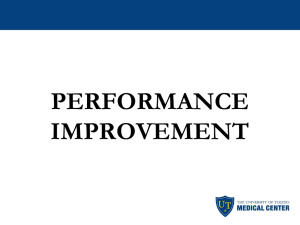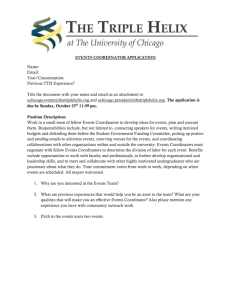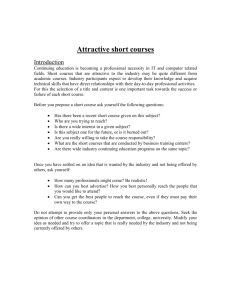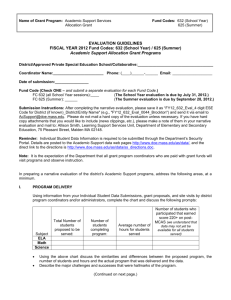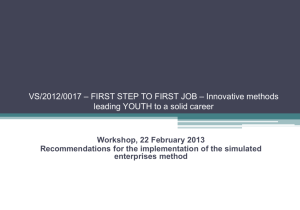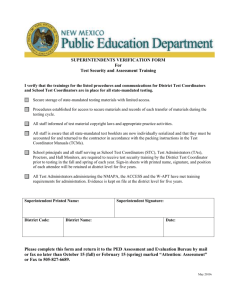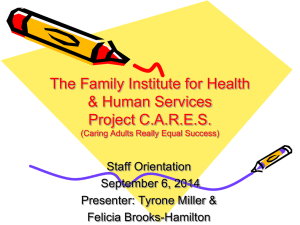North Carolina School Library Media Coordinators Standards
advertisement
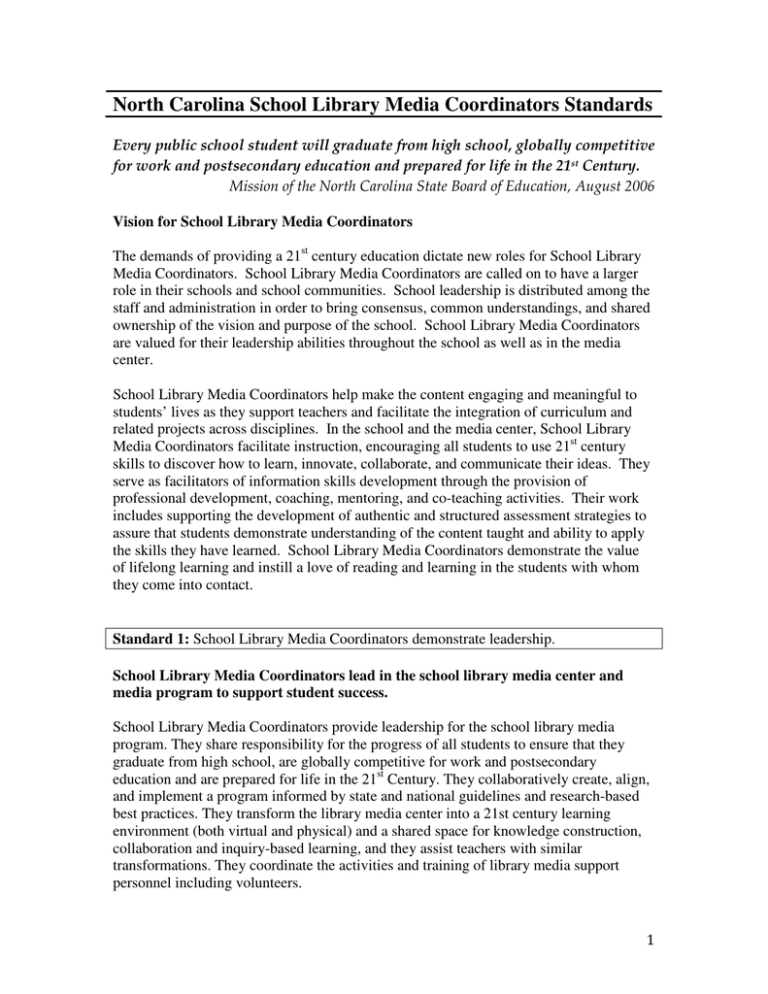
North Carolina School Library Media Coordinators Standards Every public school student will graduate from high school, globally competitive for work and postsecondary education and prepared for life in the 21st Century. Mission of the North Carolina State Board of Education, August 2006 Vision for School Library Media Coordinators The demands of providing a 21st century education dictate new roles for School Library Media Coordinators. School Library Media Coordinators are called on to have a larger role in their schools and school communities. School leadership is distributed among the staff and administration in order to bring consensus, common understandings, and shared ownership of the vision and purpose of the school. School Library Media Coordinators are valued for their leadership abilities throughout the school as well as in the media center. School Library Media Coordinators help make the content engaging and meaningful to students’ lives as they support teachers and facilitate the integration of curriculum and related projects across disciplines. In the school and the media center, School Library Media Coordinators facilitate instruction, encouraging all students to use 21st century skills to discover how to learn, innovate, collaborate, and communicate their ideas. They serve as facilitators of information skills development through the provision of professional development, coaching, mentoring, and co-teaching activities. Their work includes supporting the development of authentic and structured assessment strategies to assure that students demonstrate understanding of the content taught and ability to apply the skills they have learned. School Library Media Coordinators demonstrate the value of lifelong learning and instill a love of reading and learning in the students with whom they come into contact. Standard 1: School Library Media Coordinators demonstrate leadership. School Library Media Coordinators lead in the school library media center and media program to support student success. School Library Media Coordinators provide leadership for the school library media program. They share responsibility for the progress of all students to ensure that they graduate from high school, are globally competitive for work and postsecondary education and are prepared for life in the 21st Century. They collaboratively create, align, and implement a program informed by state and national guidelines and research-based best practices. They transform the library media center into a 21st century learning environment (both virtual and physical) and a shared space for knowledge construction, collaboration and inquiry-based learning, and they assist teachers with similar transformations. They coordinate the activities and training of library media support personnel including volunteers. 1 School Library Media Coordinators: • Align the mission, policies, resources and activities of the school’s library media program with the North Carolina Essential Standards and Common Core State Standards, local goals, and priorities for teaching and learning. • Collaborate with and support other members of the school community to select materials and promote library services and resources within the school. • Foster collaboration with teachers in their school community to facilitate the design, delivery, and assessment of instructional activities that promote learner competence and confidence with 21st century skills. • Provide leadership and support for establishing, promoting, and sustaining the effective use of information resources and technology tools. • Establish the library media center as both a physical and virtual shared learning space for 21st century teaching and learning and opportunities for students to be engaged in collaboration, and inquiry-based learning. • Represent the reading interests and curricular needs of all students in selecting and promoting information and technology resources and tools. • Use learner-centered instructional strategies and resources to model the integration of multiple literacies with content curriculum. School Library Media Coordinators lead in their schools. School Library Media Coordinators work collaboratively with school personnel to create a professional learning community. They analyze data to develop goals and strategies in the school improvement plan that enhance student learning. They provide input in determining the school budget and in the selection and provision of professional development that meets the needs of the students, the staff, and their own professional growth. They participate in the hiring process and collaborate with their colleagues to support teachers in the improvement of the effectiveness of their departments or grade levels. They establish positive working relationships and communicate with other educators to identify and select resources for curriculum support. They also partner with teachers to design instruction that seamlessly integrates 21st century skills, information fluency, and digital literacy across the curriculum. School Library Media Coordinators: • Contribute to the development and implementation of the school improvement plan. • Participate in shared decision making addressing all aspects of the school library media center’s function. • Participate with classroom teachers in professional learning communities to address student and professional achievement. • Support teachers’ efforts to infuse multiple literacies and 21st century skills within content-area instruction. • Foster collaboration among members of the school community to meet the school improvement goals. • Model and make effective use of 21st century tools for communication and collaboration. 2 • • • • • Support the school’s conversion to 21st century technology, curriculum, pedagogy, professional development, and appropriate digital resources. Provide technology-enabled one-on-one and group professional development for classroom teachers. Provide professional development in integrating information and instructional technology skills into all curricular areas. Apply principles of adult learning to provide relevant, engaging and differentiated professional development. Assist in designing effective school and classroom alternative assessment of in 21st century skills. School Library Media Coordinators advocate for effective media programs. School Library Media Coordinators are proactive in communicating the vision, requirements and impact of an effective 21st century library media program to key stakeholders using relevant research, evidence of student learning, and other outcomes. They advocate for information fluency, inquiry-based learning, curriculum fidelity, creativity, planning, innovation and reading for enjoyment and lifelong learning to ensure that all students have access to proper learning resources and are prepared for the future. School Library Media Coordinators: • Advocate for and model the seamless integration of core content with technology tools and information resources. • Advocate for equitable access to digital information, resources and tools for all students. Cultivate relationships with and communicate resource needs to decision makers and stakeholders and advocate for library resources that support the entire school community. • Establish connections with community agencies and other libraries to strengthen cooperation and increase opportunities for resource sharing. School Library Media Coordinators demonstrate high ethical standards. School Library Media Coordinators demonstrate ethical principles including honesty, integrity, fair treatment, and respect for others. They uphold the Code of Ethics for North Carolina Educators (effective June 1, 1997) and the Standards for Professional Conduct adopted April 1, 1998. School Library Media Coordinators: • Uphold the Code of Ethics for North Carolina Educators and Standards for Professional Conduct. • Apply professional standards and guidelines for school library media programs, ethical codes, and principles of education and information professions in decision making. • Model and guide best practices in copyright, ethical access and use of information and technology resources, intellectual property, digital citizenship, and safety for the school community. 3 • Demonstrate and foster appropriate digital citizenship and safety practices for all school community members. Standard 2. School library media coordinators build a learning environment that meets the instructional needs of a diverse population of students. School Library Media Coordinators establish a learning environment that facilitates access to resources and addresses the learning needs of all members of the school community. School Library Media Coordinators create a welcoming and accessible physical space that facilitates active learning, promotes participation and collaboration and teamwork, and provides flexibility to accommodate multiple learning styles, 21st century skills, and reading enjoyment. School Library Media Coordinators incorporate a global view and multiculturalism in library services, programming, and collection development to meet the personal interests and learning needs of a diverse student population. They develop and implement strategies to remove barriers to open, equitable access to the library media center and its resources. School Library Media Coordinators: • Establish a learning environment that promotes global awareness and cultural understanding. • Promote and facilitate open, equitable access and appropriate use of all information and technology resources. • Respect and meet the needs of a diverse school community. • Provide accessible and flexible physical and virtual learning spaces to foster 21st century skills. School Library Media Coordinators provide appropriate resources, services, and instruction for learners at all stages of development. School Library Media Coordinators model and promote the seamless integration of content and information, pedagogy, and technology to meet diverse student needs. They incorporate universal design to facilitate equitable access to information and resources for learning. They encourage the cultivation of creativity, reading interests, and critical thinking across multiple years of students’ school careers. School Library Media Coordinators: • Collaborate with teachers and other specialists to identify students’ interests, learning styles, and unique instructional requirements and to design instructional strategies guided by universal design principles • Use technology skills and innovative strategies to support the dynamic participation and engagement of all learners, including those with special needs. 4 • Encourage all learners to establish and maintain a positive digital footprint as they interact in web-enabled environments. 5 Standard 3. School library media coordinators implement a comprehensive 21st century library media program. School Library Media Coordinators develop a library collection that supports 21st century teaching and learning. School Library Media Coordinators develop an appropriate and high quality library media collection that facilitates 21st century teaching and learning. They use collection mapping and other collection analysis tools to ensure that the collection is dynamic, learner-centered, supports the North Carolina Essential Standards and Common Core State Standards, and meets the unique needs of the school and its learners. School Library Media Coordinators: • Continuously evaluate the library media collection to ensure that it is accurate and current and meets teacher and student needs for recreational reading and curriculum-based materials in a variety of formats. • Collaborate with members of the school community in assessing needs and using needs assessment information to inform the school’s collection development plan. • Evaluate and select new resources based on the collection development plan. • Exercise professional judgment in selecting resources that reflect the diverse developmental, cultural, social, and linguistic needs of students. • Collaborate with local technical staff to ensure that digital resources are easily accessible and reliable. School Library Media Coordinators serve, promote and facilitate inquiry-based instruction and the effective use of information and technology. School Library Media Coordinators make their skills and expertise as well as the learning space and resources of the library media center flexibly available and easily accessible to all members of the school community. They help learners become discerning and effective users of information and ideas, and they promote the seamless integration of curriculum, pedagogy and technology to meet curricular goals. They encourage teachers and students to apply an inquiry-based approach to learning and actively support instructional practices that promote creativity and critical thinking. School Library Media Coordinators: • Demonstrate best practices in the integration of information and technology skills and resources in all areas of the curriculum while modeling and supporting inquiry-based learning. • Encourage and enable use of the library media center and its resources as a shared learning space. 6 Standard 4: School library media coordinators demonstrate knowledge of learners and learning and promote effective instructional practices. School Library Media Coordinators use effective pedagogy to infuse content-area curricula with 21st century skills. School Library Media Coordinators integrate 21st century skills in instructional design, delivery, and assessment to meet curriculum objectives and produce positive learning outcomes for students. They promote best instructional practices and curriculum fidelity through collaboration and support to educators. They model and facilitate access to current information and technology tools and participatory and social learning. School Library Media Coordinators: • Use a variety of instructional strategies, resources, and assessment tools to provide digital-age learning experiences. • Model, promote, and facilitate the seamless integration of information and technology tools and resources across all content areas. • Support differentiation of instruction by choosing and modifying learning strategies, tools, and resources to meet the needs of all learners. School Library Media Coordinators know the content appropriate to their teaching specialty. School Library Media Coordinators model, promote, and support other educators in the effective use of information resources, best practices in research, multiple literacies, digital safety, and the ethical use of information and technology resources. They collaboratively develop and utilize research-based pedagogical strategies to make the curriculum rigorous and relevant for all students and provide a balanced curriculum that enhances literacy skills. They apply the content standards for students developed by their professional organizations. School Library Media Coordinators collaboratively design, use, and communicate innovative outcome measures to identify evidence of student learning using 21st century skills across all curriculum areas. School Library Media Coordinators: • Demonstrate knowledge of curriculum goals across grade levels and subject areas. • Model and promote multiple strategies in locating, evaluating and using a wide range of information and technology resources in an ethical and appropriate manner. • Foster global literacy, awareness and cultural understanding by facilitating the access and use of information from a variety of sources. • Collaborate, model and promote effective strategies for accessing, evaluating, and synthesizing information resources to support teaching and learning. 7 • • • Encourage and support all members of the learning community to synthesize and properly cite information from multiple sources and to communicate using a variety of modes and strategies. Demonstrate effective strategies to discover student interests and learning styles and to assist them in finding engaging and appropriate information resources. Utilize knowledge of appropriate assessment strategies to collaboratively design and facilitate innovative assessment of information and technology skills within content areas. School Library Media Coordinators promote reading as a foundational skill for learning. School Library Media Coordinators champion reading for information, pleasure and lifelong learning. They build relationships with students to discover reading interests and assist in finding engaging and appropriate materials to encourage a love of reading. They partner with teachers in identifying the reading interests and needs of students and recommending appropriate resources. School Library Media Coordinators: • Collaboratively plan learning experiences that offer whole classes, small groups, and individual learners an interdisciplinary approach to learning and direct students’ curiosity into an interest in reading for learning and pleasure. • Recommend and use appropriate resources to scaffold and support multiple learning styles and intelligences, reading abilities and interests. • Model, promote and support other educators in reading and writing and interaction in multiple formats and media. • Collaboratively design, deliver, and assess instructional activities that empower learners to read across multiple formats and media. • Use a variety of strategies to promote leisure reading. Standard 5: School Library Media Coordinators reflect on their practice. School Library Media Coordinators analyze student learning. School Library Media Coordinators use formative and summative assessments to collect data about student learning in the library media center and its impact on student achievement. They use multiple sources and types of data to improve their professional practice. School Library Media Coordinators: • Collect evidence regarding the effectiveness of the school library media program. • Use data on student learning and achievement to improve their professional practice and future program planning. 8 • Conduct action research to determine the impact of library services on student achievement. School Library Media Coordinators link professional growth to their professional goals. School Library Media Coordinators actively seek ongoing professional development to improve their practice and the effectiveness of the library media program. • School Library Media Coordinators complete professional development and participate in professional learning communities to explore effective applications and enhancements for improving professional practice. School Library Media Coordinators function effectively in a complex, dynamic environment. School Library Media Coordinators adapt to a rapidly changing information and technology environment. They thrive in an increasingly digital information landscape and continuously adapt their professional practice based on research and student data to support school goals. School Library Media Coordinators: • Seek input from colleagues and students regarding needed improvements to their professional practice. • Apply professional skills to investigate and apply to their practice current research on information resources, technology, pedagogy, and curriculum. 9
